初中英语延续性动词和短暂性动词例解
现在完成时延续性与暂短性动词用法

现在完成时(短暂性动词与延续性动词)的用法基本结构:主语+have/has+过去分词(done)①肯定句:主语+have/has+过去分词+其他②否定句:主语+have/has+not+过去分词+其他③一般疑问句:Have/Has+主语+过去分词+其他④特殊疑问句:特殊疑问词+一般疑问句(have/has+主语+过去分词+其他)(1)现在完成时用来表示现在之前已发生过或完成的动作或状态,但其结果却和现在有联系,也就是说,动作或状态发生在过去但它的影响现在还存在.I have spent all of my money.(含义是:现在我没有钱花了.)Jane has laid the table.(含义是:现在桌子已经摆好了.)Michael has been ill.(含义是:现在仍然很虚弱)He has returned from abroad. (含义是:现在已在此地)(2)现在完成时可以用来表示发生在过去某一时刻的,持续到现在的动作(用行为动词表示)或状态(be动词表示)常与for(+时间段),since(+时间点或过去时的句子)连用. Mary has been ill for three days.I have lived here since 1998.注(超重要):瞬间动词(buy,die,join,lose……)不能直接与for since 连用。
要改变动词come-be go out-be out finish-be over open-be opendie-be dead1.have代替buyMy brother has had(不能用has bought) this bike for almost four years.2、用keep或have代替borrowI have kept(不能用have borrowed) the book for quite a few days.3、用be替代becomeHow long has your sister been a teacher?4、用have a cold代替catch a coldTom has had a cold since the day before yesterday.5、用wear代替put onb)用“be+形容词”代终止性动词1、be+married代marry2、be+ill代fall (get) ill3、be+dead代die4、be+asleep代fall (get) asleep5、be+awake代wake/wake up6、be+gone代lose,die,sell,leave7、be+open代open 8、be closed代close/shut9、be+missing(gone,lost)代losec)用“be+副词”代终止性动词1“be+on”代start,begin2“be+up”代get up3“be+back(to)”代return to,come back to,go back to4“be here (there)”代come(arrive,reach,get) here或go (arrive,reach,get) there等等d)用“be+介词短语”代终止性动词1.“be in/at +地点”代替go to /come to2.用be in the army 代替join the army3.“be in/at +地点”代替move to常用瞬间动词变延续性动词表:1. have arrived at/in sw. got to/reached sw. come/gone/moved to sw.→have been in sw./at…相应的介词2. have come/gone back/returned → have been back3. have come/gone out →have b een out4. have become → have been5. have closed / opened→ have been close/open6. have got up → have been up;7. have died → have been dead;8. have left sw. → have been away from sw.9. have fallen asleep/got to sleep → have been asleep;10. have finished/ended/completed → have been over;11. Have married → have been married;12. have started/begun to do sth. → have done sth. ;13. have begun → have been on14. have borrowed/bought →have kept/had15. have lost → haven’t had16. have put on →have worn17. have caught /get a cold → have had a cold;18. have got to know → have known19. have/has gone to → have been in20. have joined/have taken part in the league/the Party/the army→have been a member of/ have been in/have been the Party’s member/the league member/the soldier…注意:1.现在完成时不能单独与准确时间连用,(如表示过去的时间状语)如yesterday(morning、afternoon),last(morning、afternoon)等,除非与for,since连用.2.现在完成时往往同表示不确定的过去时间状语连用,如already(肯定), yet(否定,疑问), just, before, recently,still, lately等:He has already obtained(得到\获得) a scholarship(奖学金).I haven't seen much of him recently (lately).We have seen that film before.Have they found the missing child yet ?3. 现在完成时常常与表示频度的时间状语连用,如often, sometimes, ever, never, twice等:Have you ever been to BeijingI have never heard Bunny say anything against her.I have used this pen only three times. It is still good.4. 现在完成时还往往可以同包括现在时间在内的时间状语连用,如now, these days/weeks/months/years, this morning/week/month/year, just, today, so far 等:Peter has written six papers so far.There has been too much rain in San Francisco this year.5.现在完成时的"完成用法"现在完成时的"完成用法"指的是动作发生在过去某一时刻并已结束,但该动作对现在产生了影响,与现在情况具有因果关系。
过去进行时之常见短暂性动词和延续性动词汇总
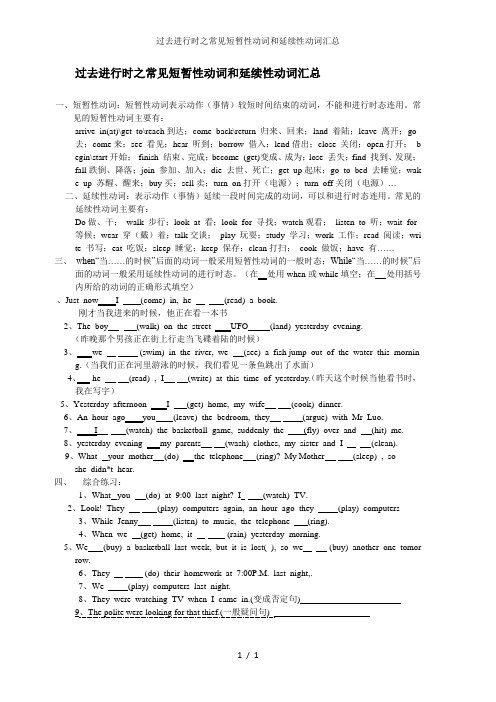
过去进行时之常见短暂性动词和延续性动词汇总过去进行时之常见短暂性动词和延续性动词汇总一、短暂性动词:短暂性动词表示动作(事情)较短时间结束的动词,不能和进行时态连用。
常见的短暂性动词主要有:arrive in(at)\get to\reach到达;come back\return 归来、回来;land 着陆;leave 离开;go 去;come来;see 看见;hear 听到;borrow 借入;lend借出;close 关闭;open打开;b egin\start开始;finish 结束、完成;become (get)变成、成为;lose 丢失;find 找到、发现;fall跌倒、降落;join 参加、加入;die 去世、死亡;get up起床;go to bed 去睡觉;wake up 苏醒、醒来;buy买;sell卖;turn on打开(电源);turn off关闭(电源)…二、延续性动词:表示动作(事情)延续一段时间完成的动词,可以和进行时态连用。
常见的延续性动词主要有:Do做、干;walk 步行;look at 看;look for 寻找;watch观看;listen to 听;wait for 等候;wear 穿(戴)着;talk交谈;play 玩耍;study 学习;work 工作;read 阅读;wri te 书写;eat 吃饭;sleep 睡觉;keep 保存;clean打扫;cook 做饭;have 有……三、when“当……的时候”后面的动词一般采用短暂性动词的一般时态;While“当……的时候”后面的动词一般采用延续性动词的进行时态。
(在处用when或while填空;在处用括号内所给的动词的正确形式填空)、Just now I (come) in, he (read) a book.刚才当我进来的时候,他正在看一本书2、The boy (walk) on the street UFO (land) yesterday evening.(昨晚那个男孩正在街上行走当飞碟着陆的时候)3、we (swim) in the river, we (see) a fish jump out of the water this morning.(当我们正在河里游泳的时候,我们看见一条鱼跳出了水面)4、 he (read) , I (write) at this time of yesterday.(昨天这个时候当他看书时,我在写字)5、Yesterday afternoon I (get) home, my wife (cook) dinner.6、An hour ago you (leave) the bedroom, they (argue) with Mr Luo.7、 I (watch) the basketball game, suddenly the (fly) over and (hit) me.8、yesterday evening my parents (wash) clothes, my sister and I (clean).9、What your mother (do) the telephone (ring)? My Mother (sleep) , soshe didn*t hear.四、综合练习:1、What you (do) at 9:00 last night? I (watch) TV.2、Look! They (play) computers again, an hour ago they (play) computers3、While Jenny (listen) to music, the telephone (ring).4、When we (get) home, it (rain) yesterday morning.5、We (buy) a basketball last week, but it is lost( ), so we (buy) another one tomorrow.6、They (do) their homework at 7:00P.M. last night,.7、We (play) computers last night.8、They were watching TV when I came in.(变成否定句)9、The polite were looking for that thief.(一般疑问句)1 / 1。
常用短暂性动词与延续性动词及其例句
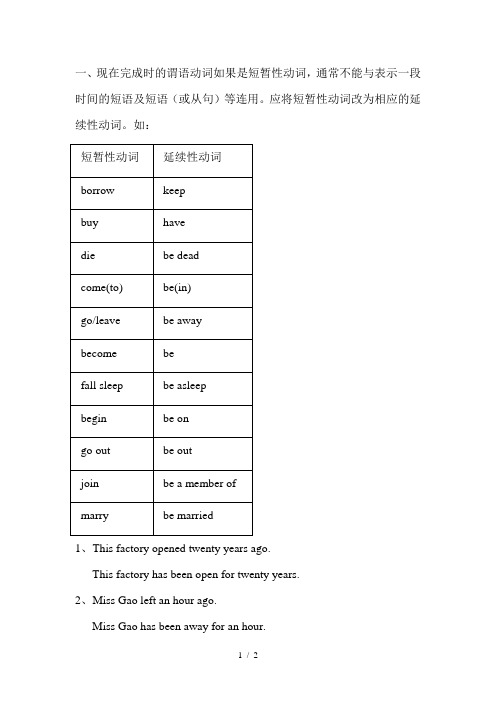
一、现在完成时的谓语动词如果是短暂性动词,通常不能与表示一段时间的短语及短语(或从句)等连用。
应将短暂性动词改为相应的延续性动词。
如:1、This factory opened twenty years ago.This factory has been open for twenty years.2、Miss Gao left an hour ago.Miss Gao has been away for an hour.3、Her teacher has been a Party member for 3 years.Her teacher joined the Party 3 years ago.4、The film began two minutes ago.The film has been on since two minutes ago.5、He bought the bike two years ago.He has had the bike for two years.6、The old man died ten years ago.The old man has been dead for ten years.7、He came back 3 days ago.He has been back for 3 days.8、I left my hometown 10 years ago.I have been away from my hometown for 10 years.9、They got married 13 year ago.They have been married for 13 years.10、I borrowed the book a week ago.I have kept the book for a week.How long have you kept the book?注:在否定句中,短暂性动词可以和表示一段时间的状语连用。
英语知识 _ 初中英语,延续性动词和瞬间性动词的用法

一、延续性动词延续性动词,表示的动作不但可以延续,而且可以产生持久的影响。
常见的这类动词有:b e,h a v e,ke e p,k n o w,l e a r n,l i e,l i v e,re a d,s i n g,s l e e p,s t a n d,s t a y,w a i t,w a l k,w a tc h等。
延续性动词的用法很广,但常见于现在完成时中的句子中,且常与f o r,h o w,l o n g,s i n c e 等引导的表示一段时间的状语或状语从句连用。
例如:I h a v e l e a r n e d m o re t h a n1000C h i n e s e w o rd s s i n c e I c a m e t o C h i n a.自从来到中国,我已经学会了l千多个汉字。
I h a v e ke p t t h e p i c t u re f o r a b o u t t h re e y e a r s.。
这张画我保存了大约三年二、瞬间性动词瞬间性动词,又称为终止性动词或非延续性动词,它表示的动作不能延续,也就是说动作一旦发生就立即结束,并产生某种结果。
常见的这类动词有:a c c e p t,a r r i v e,b ec o m e,b e g i n,b o r ro w,b re a k,b u y,c a tc h,c l o s e,c o m e,d i e,e n d,f a l l,f i n i s h,g e t,g i v e,g o,j o i n,l e a v e,p u t,re a c h,re c e i v e,sh u t,s t a r t,s t o p等。
用在现在完成时要注意下面三点:①瞬间性动词可直接用来表示某一动作的完成。
例如:T h e y h a v e re a c h e d S h a n g h a i.他们已经到达了上海。
初中英语中短暂性动词与延续性动词的用法

初中英语中短暂性动词与延续性动词的用法英语中,按动词延续的时间长短,可将动词分为延续性动词和短暂性动词。
延续性动词如learn, study, work, play, wait等。
短暂性动词是非延续性动词,即动作一开始便结束的动词,又可称结束性动词,瞬间动词,如come, go, begin, start, become, join, end, die, buy, arrive, reach, borrow, lend, get to know等。
一.短暂性动词与延续性动词在现在完成时中的用法:现在完成时中用法(一):表示发生在过去,迄今已经完成,并对现在产生影响或产生结果的动作,常用ever, yet, already, just等状语,谓语动词既可是延续性动词,也可是短暂性动词。
如:She has just borrowed the book from the library.(borrow是短暂性动词)I have learned a little about Japanese. (learn 是延续性动词)现在完成时中用法(二):表示始于过去某时并一直延续到现在的动作或状态,常与表示始于过去某一时刻并一直延续到现在的时间状语连用。
如:They have lived in Nantong since 1990. (live 是延续性动词)Mr. Black has worked here since he came to China.(work 是延续性动词)I have learned English for two and a half years.(learn 是延续性动词)所以,在现在完成时中用法(二)中,在表示持续一段时间的句子中,应将短暂性动词转化为相同意义的延续性动词或状态动词。
初中英语中常见的有:例如:1. His grandfather has died for ten years.(F)His grandfather has been dead for ten years.(T)2. My brother has joined the army for five years.(F)My brother has been in the army for five years.(T)My brother has been an armyman for ten years.(F)3. He has gone away for a week.(F) He has been away for a week.(T)4. The film has begun for fifteen minutes.(F)The film has been on for fifteen minutes.(T)但是,短暂性动词的现在完成时的否定形式可以表示一种延续的状态,因此可以和表示一段的状语连用。
短暂性动词与延续性动词详解-转换表及练习
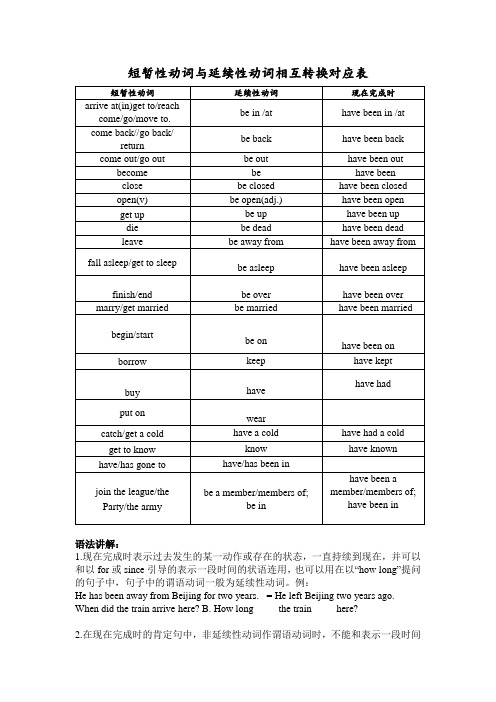
短暂性动词与延续性动词相互转换对应表语法讲解:1.现在完成时表示过去发生的某一动作或存在的状态,一直持续到现在,并可以和以 for或since引导的表示一段时间的状语连用,也可以用在以“how lon g”提问的句子中,句子中的谓语动词一般为延续性动词。
例:He has been away from Beijing for two years. = He left Beijing two years ago. When did the train arrive here? B. How long ____ the train ____ here?2.在现在完成时的肯定句中,非延续性动词作谓语动词时,不能和表示一段时间的状语连用。
但可以用其他句式来表示同一个意思。
例:Lucy has come back.The old man died 4 years ago. = The old man has been dead for 4 years.He has been away from Beijing for two years.= He left Beijing two years ago.= It is two years since he left Beijing.= Two years has passed since he left Beijing.3.非延续性动词可以在现在完成时的否定句中作谓语,并可以与for,since引导的时间状语连用,表示动作的延续过程。
例如:She hasn’t bought any new clothes since last year.I haven’t borrowed the book for a long time.巩固习题:1. When he arrived at the bus stop, the bus ________ for 20 minutes.A. has leftB. had leftC. has been awayD. had been away2. I ______ the League for 5 years so far.A. joinedB. have joinedC. have been in3. The factory ________ since the February of 1988.A . has been open B. has opened C. was open D. opened4. Mary and Rose _______friends since they met in 2000.A. have madeB. have beenC. madeD. have become5.The meeting _______ for a week now.A. has finishedB. has endedC. has been over6.Miss Gao ______ this school for nearly 5 years.A. has been inB. has come toC. has taught7.Ben ______ a teacher for 4 years .A. has beenB. has becomeC. wasD. became8. I ______ home for a week.A. have returnedB. have been backC. returned9. How long _______ he ________ ?A. diedB. has, diedC. has, been dead10. ----- How long can I ______ the book? ------ Two weeks.A. borrowB. lendC. getD. keep11.He ________ the car for a week.A. boughtB. has boughtC. has had12.-----How long _____ you _____ ill ? -----Two weeks.A. did fallB. have, fellC. have, been13.Since 2000, he _____ his hometown.A. has leftB. has moved awayC. has been away from14.I'll lend you the book , but you can only _____ it for 2 days.A. borrowB. keepC. take15.The bus ______ on the road for 2 hours so far.A. has stoppedB. stoppedC. has been16. Tom is ill in hospital. He _______ a cold for several days.A. isB. catchesC. has caughtD. has had17.He ________ for 2 hours.A. got upB. has got upC. has been up。
短暂性动词和延续性动词
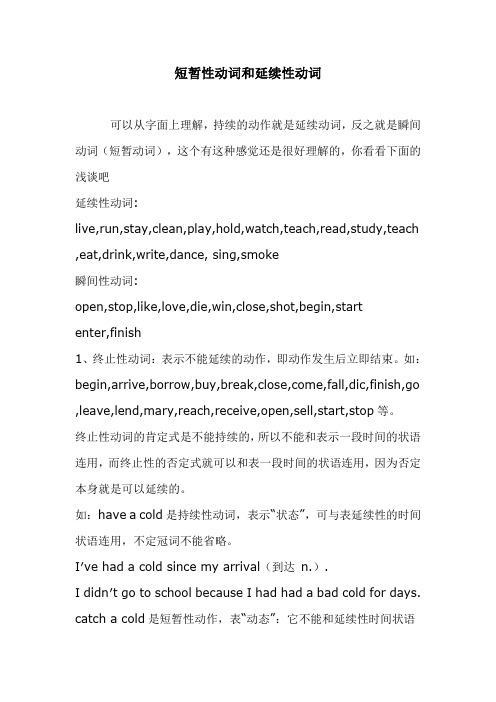
短暂性动词和延续性动词可以从字面上理解,持续的动作就是延续动词,反之就是瞬间动词(短暂动词),这个有这种感觉还是很好理解的,你看看下面的浅谈吧延续性动词:live,run,stay,clean,play,hold,watch,teach,read,study,teach ,eat,drink,write,dance, sing,smoke瞬间性动词:open,stop,like,love,die,win,close,shot,begin,startenter,finish1、终止性动词:表示不能延续的动作,即动作发生后立即结束。
如:begin,arrive,borrow,buy,break,close,come,fall,dic,finish,go ,leave,lend,mary,reach,receive,open,sell,start,stop等。
终止性动词的肯定式是不能持续的,所以不能和表示一段时间的状语连用,而终止性的否定式就可以和表一段时间的状语连用,因为否定本身就是可以延续的。
如:have a cold是持续性动词,表示“状态”,可与表延续性的时间状语连用,不定冠词不能省略。
I′ve had a cold since my arrival(到达n.).I didn′t go to school because I had had a bad cold for days. catch a cold是短暂性动作,表“动态”:它不能和延续性时间状语连用,不定冠词“a”可有可无,catch可用take,get代替。
Put on your coat,or you′ll catch/take/get a cold.Take care not to get cold.但是,若cold前有形容词修饰时,则不定冠词不能省。
如:Brown has taken a slight cold.注意下列句子:I have caught a cold for over a week.(×)I have had a cold for over a week.( )2、延续性动词:表示可以延续一段时间的动作或状态。
短暂性动词与延续性动词语法讲解
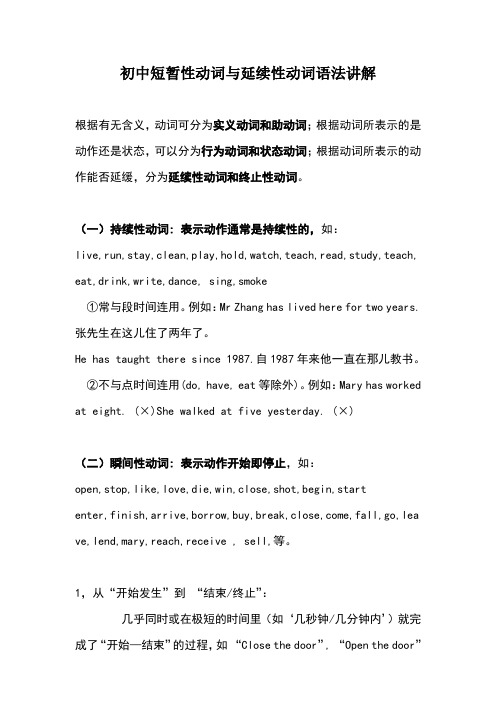
初中短暂性动词与延续性动词语法讲解根据有无含义,动词可分为实义动词和助动词;根据动词所表示的是动作还是状态,可以分为行为动词和状态动词;根据动词所表示的动作能否延缓,分为延续性动词和终止性动词。
(一)持续性动词: 表示动作通常是持续性的,如:live,run,stay,clean,play,hold,watch,teach,read,study,teach, eat,drink,write,dance, sing,smoke①常与段时间连用。
例如:Mr Zhang has lived here for two years.张先生在这儿住了两年了。
He has taught there since 1987.自1987年来他一直在那儿教书。
②不与点时间连用(do, have, eat等除外)。
例如:Mary has worked at eight. (×)She walked at five yesterday. (×)(二)瞬间性动词: 表示动作开始即停止,如:open,stop,like,love,die,win,close,shot,begin,startenter,finish,arrive,borrow,buy,break,close,come,fall,go,lea ve,lend,mary,reach,receive , sell,等。
1,从“开始发生”到“结束/终止”:几乎同时或在极短的时间里(如‘几秒钟/几分钟内’)就完成了“开始—结束”的过程,如“Close the door”, “Open the door”2,有些瞬间动词的“开始—结束的过程”可能稍微长一些,但也不会很长的,如,“buy sth(买下)”:付了款、拿了发票即完成了。
所以,“我买了这块手表5年了”,在汉语中说的通,但英语的表达就不能说:I have bought the watch for five years.buy sth ---- have sth (拥有)---have/has + had sth for…A: I have had the watch for 5 years.B: It is (has been) five years since I bought the watch. C: I bought it 5 years ago.同理,“borrow sth”“借书”在办理了相关的‘登记’手续后就结束了,不可能“借”几个星期或好几年的!汉语“这本书我已经借用了2星期了。
短暂性动词和延续性动词

短暂性动词和延续性动词短暂性动词也称做终止性动词、非延续性动词或瞬间动词,表示动作不能延续,只是一瞬间就结束的动作.常见的短暂性动词有:come, go, arrive, reach, see, hear, close, open, leave, begin, start, lose, buy, fall, join, die, become, borrow, get up等.用法:1、它们可以用于完成时态,说明某个动作的结果还存在.e.g. He has come back.The film has begun.2、这类动词不能和表示一段时间的状语连用,但在否定句中,非延续性动词也可以用表示一段时间的状语来修饰.e.g. I haven’t heard from Uncle Wang for a long time.We haven’t seen him since 1992.She hasn’t left home all her life.3、还可改用一般过去时来表达.e.g. He came back a week ago.4、也可用“It is ﹢一段时间﹢since…”句型来表达.e.g. It is a week since he came back.非延续性动词可以转换成延续性动词,主要有以下几种:①、用相应的延续性动词;buy ------ have,borrow ----- keep,put on ------ wear,catch/get a cold ------ have a cold,come/go/become ------ be.②、转换成be﹢名词;join the Party ------ be a Party member,join the army ------ be a soldier,go to school ------ be a student.③、转换成be + 介词短语:go to school ------ be in school,join the army ------ be in the army.④、转换成be + adj./adv. :die ------ be dead, finish ------ be over, begin/start ------ be on, leave (…) ------ be away (from),close ------ be closed, open ------ be open,fall asleep ------ be asleep.巩固练习:(同义转换,每空一词)1.Li Lei joined the Party three years ago.Li Lei ___ ____ ____ the Party _____ three years ago.Li Lei _____ _____ _____ the Party _____ three years._____ three years ______ Li Lei joined the Party.Three years _____ ______ _____ Li Lei joined the Party.2.My father left Gucheng last week.My father _____ _______ _______ Gucheng _____ last week.My father _____ _______ ______ Gucheng_____ a week.3.The factory opened in 1996.The factory ____ _______ _______ ten years.The factory_____ _______ _______ since 1996.4. His grandfather died five years ago.His grandfather_____ _______ _____ since .His grandfather_____ _______ _______ five years.______five years _____ ______his grandfather died.Five years _____ _______ _______his grandfather died.5. Mr. Wang reached Beijing five days ago.Mr. Wang_____ ______ _____ Beijing _____ five days ago.Mr. Wang_____ ______ ______ Beijing_____ five days.6. The film began ten minutes ago.The film_____ ______ ______ for _______ .The film _____ ______ _____ since______ . 7. My father bought a new car two years ago.My father _____ _____ a new car _____ two years.My father _____ _____ a new car _____ two years ago.8.Tom borrowed this book four days ago.Tom _____ ______ this book _____ four days.Tom _____ ______ this book _____ four days ago.9. Jim joined the League last yeas.Jim _____ _____ a League member _____ a year.Jim _____ _____ _____ the League _____ last year.10. They came to China ten years ago.They _____ _____ _____ China _____ ten years.They _____ _____ _____ China _____ ten years ago.11. My son fell asleep half an hour ago.My son _____ _____ _____ for _____ _____ _____.My son _____ _____ _____ since _____ _____ _____ _____.。
短暂性动词与延续性动词语法讲解
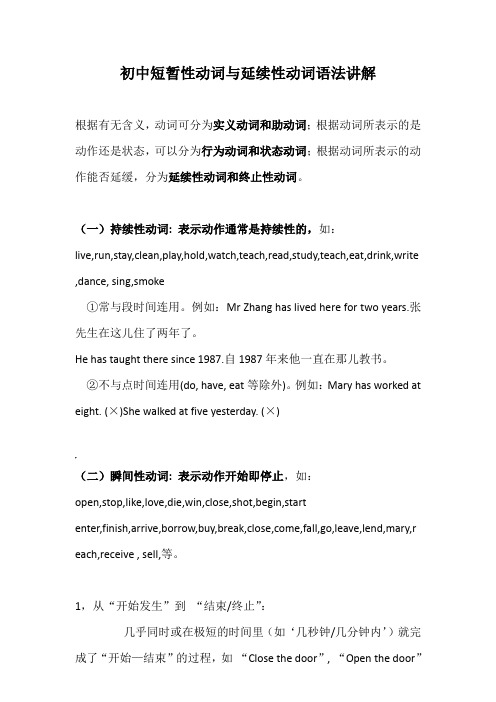
初中短暂性动词与延续性动词语法讲解根据有无含义,动词可分为实义动词和助动词;根据动词所表示的是动作还是状态,可以分为行为动词和状态动词;根据动词所表示的动作能否延缓,分为延续性动词和终止性动词。
(一)持续性动词: 表示动作通常是持续性的,如:live,run,stay,clean,play,hold,watch,teach,read,study,teach,eat,drink,write ,dance, sing,smoke①常与段时间连用。
例如:Mr Zhang has lived here for two years.张先生在这儿住了两年了。
He has taught there since 1987.自1987年来他一直在那儿教书。
②不与点时间连用(do, have, eat等除外)。
例如:Mary has worked at eight. (×)She walked at five yesterday. (×),(二)瞬间性动词: 表示动作开始即停止,如:open,stop,like,love,die,win,close,shot,begin,startenter,finish,arrive,borrow,buy,break,close,come,fall,go,leave,lend,mary,r each,receive , sell,等。
1,从“开始发生”到“结束/终止”:几乎同时或在极短的时间里(如‘几秒钟/几分钟内’)就完成了“开始—结束”的过程,如“Close the door”, “Open the door”2,有些瞬间动词的“开始—结束的过程”可能稍微长一些,但也不会很长的,如,“buy sth(买下)”:付了款、拿了发票即完成了。
所以,“我买了这块手表5年了”,在汉语中说的通,但英语的表达就不能说:I have bought the watch for five years.buy sth ---- have sth (拥有)---have/has + had sth for…A: I have had the watch for 5 years.、B: It is (has been) five years since I bought the watch.C: I bought it 5 years ago.同理,“borrow sth”“借书”在办理了相关的‘登记’手续后就结束了,不可能“借”几个星期或好几年的!汉语“这本书我已经借用了2星期了。
短暂性动词与延续性动词语法讲解
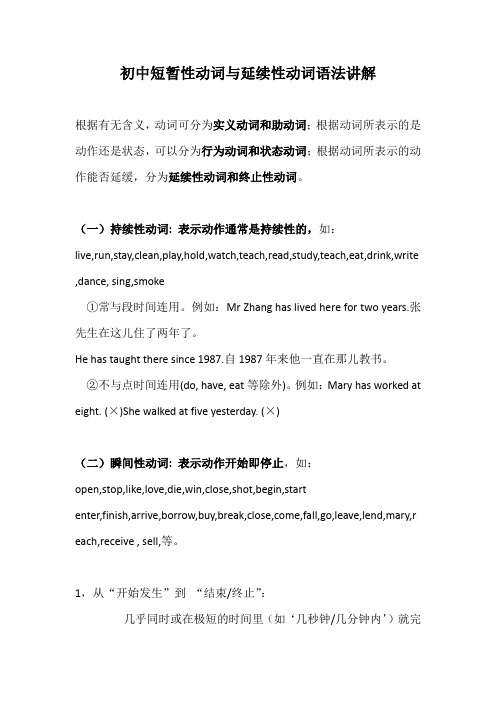
初中短暂性动词与延续性动词语法讲解根据有无含义,动词可分为实义动词和助动词;根据动词所表示的是动作还是状态,可以分为行为动词和状态动词;根据动词所表示的动作能否延缓,分为延续性动词和终止性动词。
(一)持续性动词: 表示动作通常是持续性的,如:live,run,stay,clean,play,hold,watch,teach,read,study,teach,eat,drink,write ,dance, sing,smoke①常与段时间连用。
例如:Mr Zhang has lived here for two years.张先生在这儿住了两年了。
He has taught there since 1987.自1987年来他一直在那儿教书。
②不与点时间连用(do, have, eat等除外)。
例如:Mary has worked at eight. (×)She walked at five yesterday. (×)(二)瞬间性动词: 表示动作开始即停止,如:open,stop,like,love,die,win,close,shot,begin,startenter,finish,arrive,borrow,buy,break,close,come,fall,go,leave,lend,mary,r each,receive , sell,等。
1,从“开始发生”到“结束/终止”:几乎同时或在极短的时间里(如‘几秒钟/几分钟内’)就完成了“开始—结束”的过程,如“Close the door”, “Open the door”2,有些瞬间动词的“开始—结束的过程”可能稍微长一些,但也不会很长的,如,“buy sth(买下)”:付了款、拿了发票即完成了。
所以,“我买了这块手表5年了”,在汉语中说的通,但英语的表达就不能说:I have bought the watch for five years.buy sth ---- have sth (拥有)---have/has + had sth for…A: I have had the watch for 5 years.B: It is (has been) five years since I bought the watch.C: I bought it 5 years ago.同理,“borrow sth”“借书”在办理了相关的‘登记’手续后就结束了,不可能“借”几个星期或好几年的!汉语“这本书我已经借用了2星期了。
延续性动词和短暂性动词笔记
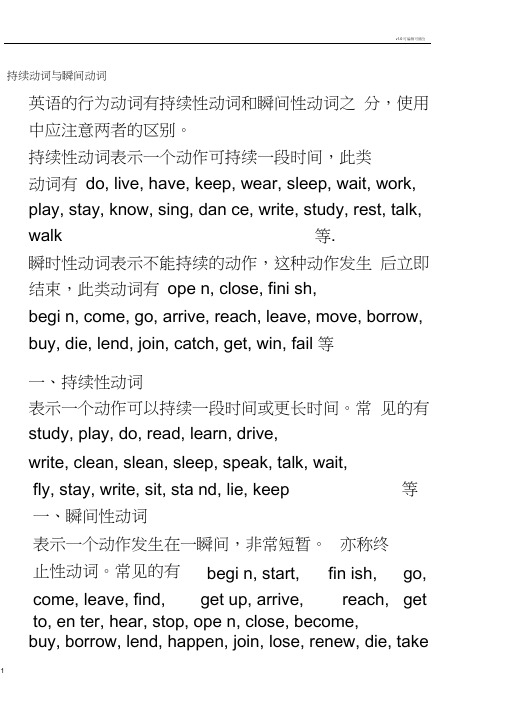
持续动词与瞬间动词英语的行为动词有持续性动词和瞬间性动词之分,使用中应注意两者的区别。
持续性动词表示一个动作可持续一段时间,此类动词有do, live, have, keep, wear, sleep, wait, work, play, stay, know, sing, dan ce, write, study, rest, talk, walk 等.瞬时性动词表示不能持续的动作,这种动作发生后立即结束,此类动词有ope n, close, fini sh,begi n, come, go, arrive, reach, leave, move, borrow, buy, die, lend, join, catch, get, win, fail 等一、持续性动词表示一个动作可以持续一段时间或更长时间。
常见的有study, play, do, read, learn, drive,write, clean, slean, sleep, speak, talk, wait,fly, stay, write, sit, sta nd, lie, keep 等。
一、瞬间性动词表示一个动作发生在一瞬间,非常短暂。
亦称终止性动词。
常见的有begi n, start, fin ish, go, come, leave, find, get up, arrive, reach, get to, en ter, hear, stop, ope n, close, become,buy, borrow, lend, happen, join, lose, renew, die, takeaway, put up, set out, put on, get on/off 等。
以上已集中了初中教材的大部分持续性动词及瞬间性动词。
三、用法1、持续性动词在完成时中能与表示持续一段时间的状语连用,而瞬间性动词则不能。
短暂性动词与延续性动词

• 11. The young man ______ to Beijing. He is working there now. • 12. The students ______ to the cinema to see a film today. Now they are back. • 13. Tom isn’t at home. He ______ to school. • 14. Mr. and Mrs. Smith ______ to London now. • They ______ there twice already. • 15. Mr. Smith ______ to Britain and France this year. Now he is telling his students about his trip.
of…
borrow →keep come → be in
buy/get →have
marry → be married
习题
• 1. Mr. Li began to teach English in this school in 1999.(同义句) • Mr. Li ______ _______ English in this school since 1999. • 2. The factory opened ten years ago.(同 义句 • The factory _______ _____ ______ for ten years.
• 16. All the students ______ to the meeting to listen to a lecture. • 17. Where is Jerry? • He isn’t here now. He ______ to the library to borrow books. • 18. Miss Li ______ never ______ to China before. • 19. Where ______ you ______? The meeting has already begun. • 20. Where ______ he ______? I can’t find him anywhere.
延续性动词和短暂性动词笔记

延续性动词表示能够延续的动作,这种动作可以延续下去或产生持久影响。
如:learn, work, stand, lie, know, walk, keep, have, wait, watch, sing, read, sleep, live, stay等。
终止性动词也称非延续性动词、瞬间动词或短暂性动词,表示不能延续的动作,这种动作发生后立即结束。
如open, close, finish, begin, come, go, arrive, reach, get to, leave, move, borrow,buy等。
Come-be hereGo – be thereleave→be away,borrow→keep,buy→have,begin/start→be on,die→be dead,move to→live in,finish→be over,join→be in/be a member of,open sth.→keep sth. open,fee l ill→be ill,get up→be up,catch a cold→have a col dcome here --- be here,go there --- be there,become --- be,come back --- be back,fall asleep --- be asleep,get to/ arrive/reach --- be (in),leave --- be away from,get to know --- know,go (get) out →be out,put on→ wear;例:The old man died 4 years ago.----The old man has been dead for 4 years.---- It is 4 years since the old man died.---Four years has passed since the old man died.He joined the Party 2 years ago.-----He has been in the Party for 2 years.I bought the book 5 days ago.---- I have had the book for 5 days.补充练习:1. When he arrived at the bus stop, the bus ________ for 20 minutes.A. has leftB. had leftC. has been awayD. had been away2. I ______ the League for 5 years so far.A. joinedB. have joinedC. have been in3. The factory ________ since the February of 1988.A . has been open B. has opened C. was open D. opened4. Mary and Rose _______friends since they met in 2000.A. have madeB. have beenC. madeD. have become5.You mustn't ________ until he comes back.A. be awayB. leaveC. be left6.The meeting _______ for a week now.A. has finishedB. has endedC. has been over7.Miss Gao ______ this school for nearly 5 years.A. has been inB. has come toC. has taught8.Ben ______ a teacher for 4 years .A. has beenB. has becomeC. wasD. became9. I ______ home for a week.A. have returnedB. have been backC. returned10. How long _______ he ________ ?A. diedB. has, diedC. has, been dead11. ----- How long can I ______ the book? ------ Two weeks.A. borrowB. lendC. getD. keep12.He ________ the car for a week.A. boughtB. has boughtC. has had13.-----How long _____ you _____ ill ? -----Two weeks.A. did fallB. have, fellC. have, been14.Since 2000, he _____ his hometown.A. has leftB. has moved awayC. has been away from15.I'll lend you the book , but you can only _____ it for 2 days.A. borrowB. keepC. take16.The bus ______ on the road for 2 hours so far.A. has stoppedB. stoppedC. has been17.Are you _____ the jacket these days?A. wearingB. putting onC. dressingD. on18.He ________ for 2 hours.A. got upB. has got upC. has been up19. Tom is ill in hospital. He _______ a cold for several days.A. isB. catchesC. has caughtD. has had。
延续性动词和短暂性动词笔记

持续动词与瞬间动词英语的行为动词有持续性动词和瞬间性动词之分,使用中应注意两者的区别。
持续性动词表示一个动作可持续一段时间,此类动词有do, live, have, keep, wear, sleep, wait, work, play, stay, know, sing, dance, write, study, rest, talk, walk等.瞬时性动词表示不能持续的动作,这种动作发生后立即结束,此类动词有open, close, finish, begin, come, go, arrive, reach, leave, move, borrow, buy, die, lend, join, catch, get, win, fail等一、持续性动词表示一个动作可以持续一段时间或更长时间。
常见的有study, play, do, read, learn, drive, write,clean, slean, sleep, speak, talk, wait, fly, stay, write, sit, stand, lie, keep等。
二、瞬间性动词表示一个动作发生在一瞬间,非常短暂。
亦称终止性动词。
常见的有begin, start, finish, go, come, leave, find, get up, arrive, reach, get to, enter,hear, stop, open, close, become, buy, borrow, lend, happen, join, lose, renew, die, take away, put up,set out, put on, get on/off等。
以上已集中了初中教材的大部分持续性动词及瞬间性动词。
三、用法1、持续性动词在完成时中能与表示持续一段时间的状语连用,而瞬间性动词则不能。
例如:His parents talked with the teacher for half an hour.(他的父母跟老师谈了半个小时。
过去进行时之常见短暂性动词和延续性动词汇总
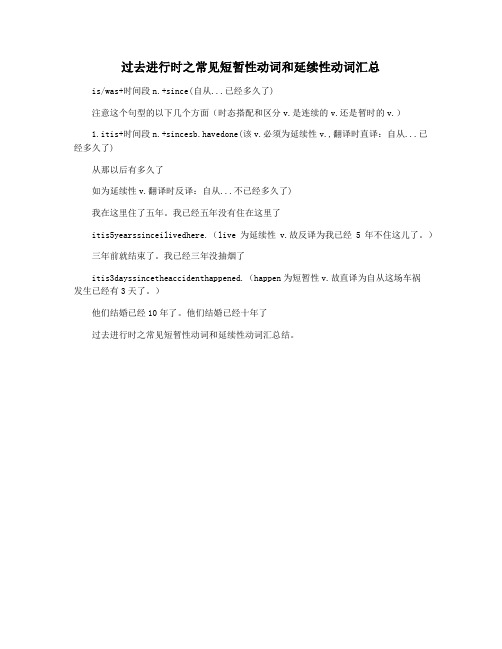
过去进行时之常见短暂性动词和延续性动词汇总
is/was+时间段n.+since(自从...已经多久了)
注意这个句型的以下几个方面(时态搭配和区分v.是连续的v.还是暂时的v.)
1.itis+时间段n.+sincesb.havedone(该v.必须为延续性v.,翻译时直译:自从...已经多久了)
从那以后有多久了
如为延续性v.翻译时反译:自从...不已经多久了)
我在这里住了五年。
我已经五年没有住在这里了
itis5yearssinceilivedhere.(live为延续性v.故反译为我已经5年不住这儿了。
)
三年前就结束了。
我已经三年没抽烟了
itis3dayssincetheaccidenthappened.(happen为短暂性v.故直译为自从这场车祸
发生已经有3天了。
)
他们结婚已经10年了。
他们结婚已经十年了
过去进行时之常见短暂性动词和延续性动词汇总结。
- 1、下载文档前请自行甄别文档内容的完整性,平台不提供额外的编辑、内容补充、找答案等附加服务。
- 2、"仅部分预览"的文档,不可在线预览部分如存在完整性等问题,可反馈申请退款(可完整预览的文档不适用该条件!)。
- 3、如文档侵犯您的权益,请联系客服反馈,我们会尽快为您处理(人工客服工作时间:9:00-18:30)。
Reading Material(D) 延续性动词和短暂性动词例解
A1. I have bought a pen already. A2. I bought a pen two days ago.
A3. I have had a new pen for 2 days. A4. I haven’t bought anything for two months.
B1. I borrowed a book from the library three days ago.
B2. I can keep it two weeks. B3. I have kept it for three days.
C1. His great-grandfather has died already. C2. His great-grandfather has been dead for 10 years.
C3. His great-grandfather died 10 years ago.
D1. He has joined the army aready. D2. He joined the army three years ago.
D3. He has been a soldier for three years. =D4. He has been in the army for three years.
D5. It is three years since my brother joined the army.
D6. It has been three years since my brother joined the army.
E1. The film has been on for ten minutes. E2. The film began/started 10 minute ago.
E3. It’s five minutes since the film began. E4. It has been five minutes since the film began.
F1. He has been away from Beijing for two years. F2. He left Beijing two years ago.
F3. It is two years since he left Beijing. F4. Two years has passed since he left Beijing.
F5. His sister hasn’t left Beijing since two years ago.
G1. I hear he has come back. (√) G2. I hear he has come back for a few days. (×)
G3. I hear he has been back for a few days. (√) G4. I haven”t heard from him for two weeks. (√) H1. I have caught a cold for over a week.( ×) H2. I have had a cold for over a week.(√ )
I1. I have lost my watch aready. I2. I lost it a month ago. I3. My watch have been lost for a month.
J1. It”s two years since we got to know each other. 我们互相认识已有两年了。
K1. She has been up for quite some time.(她起床已有好久了。
)不能用has got up
K2. I got up two hours ago. K3. I have been up since two hours ago.
L1. The bus arrived at the station ten minutes ago.汽车到站十分钟了。
M1. We finished the work three days ago.我们完成这项工作三天了。
M2. The meeting finished at 10:00 am. M3. The meeting has been over for 2 hours.
N1. It’s two weeks since I returned the book to the library. 这本书我还给图书馆已有两周了。
N2. We return to Fuzhou yesterday. N3. We have been back to Fuzhou since yesterday.
O1. Mr Xi became a teacher in 1989. O2. Mr Xi has been a teacher for 21 years/since 1989.
P1. The shop closed two hours ago. P2. The shop has been closed for two hours.
Q1. The door opened at 7:00 in the morning. Q2. The door has been open for six hours.
R1. I got to sleep two hours ago. R2. I have been asleep since two hours ago.
S1. They married in 1990. S2. They have been married since 1990.
T1. I put on my glasses three years ago. T2. I have worn my glasses for 3years.
U1. Where are your English teacher? He has gone to Beijing.
U2. When did he go to Beijing? He went there 3 days ago.
U3. How long has he been there? Maybe he has been to Beijing for 3 days.
V1. They came here last week. V2. They have been here since last week.
V3. He came out two years ago. V4. He has been out for two years.
常见的延续性动词或叫持续性动词:study, play, do, read, learn, drive, write, clean, sleep, speak, talk, wait, fly, stay, write, sit, stand, lie, keep等;
常见的瞬间性动词亦称终止性动词:begin, start, finish, go come, leave, find, get up, arrive, reach, get to, enter, hear, stop, open, close, become, buy, borrow, lend, happen, jion, lose, die, take away, put up, set out, put on, get on, get off等. 2010-5-30 席铸。
